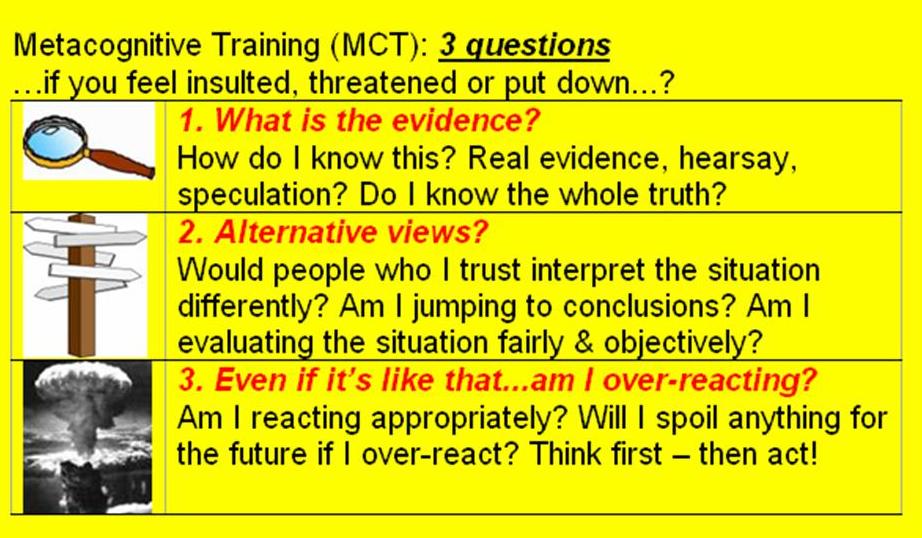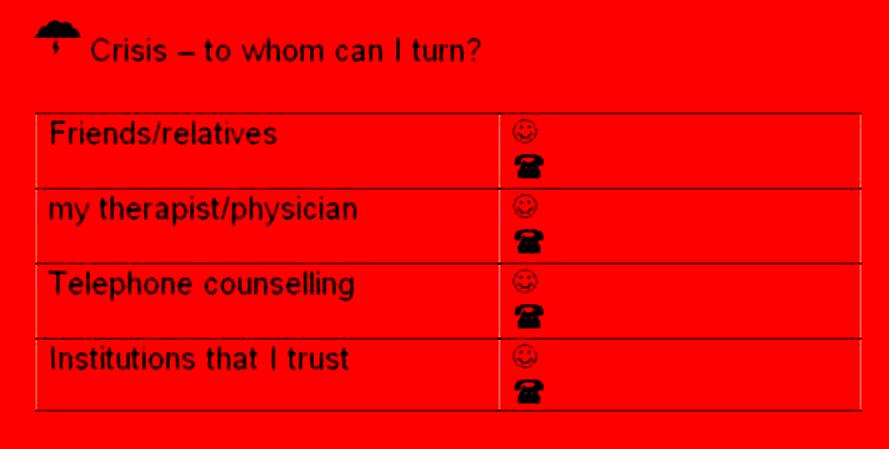- English
- Metacognitive Training (MCT)
- Metacognitive Training (MCT) for Psychosis
- Metacognitive Training (MCT) for Psychosis (Urdu)
Metacognitive Training (MCT) for Psychosis (Urdu)
Via the web-links below, you can download the MCT modules and homework. Please also see two new modules addressing self-esteem and stigma, which should be conducted in addition to the standard modules.
Please Support Our Work
We are pleased to provide the MCT materials—such as manuals, slides, and worksheets—free of charge. However, to help us continue and expand this work, we kindly ask for your support. We suggest a donation of $35/35€ for individuals or $100/100€ for institutions. Click here to donate.
Your generosity enables us to regularly update and expand the MCT materials, conduct rigorous scientific evaluations, and translate the program into additional languages—allowing more people worldwide to access effective, low-threshold support.
You can donate online via this link. For details on how contributions are used, please see here. We are happy to provide an official donation receipt upon request.
Please note that we have also developed certified e-trainings for MCT for psychosis (www.uke.de/e-mct) and D-MCT for depression (www.uke.de/e-dmct) for therapists. For an e-learning on body-focused repetitive behaviors, see www.uke.de/e-bfrb-training.
To view the modules, you need to install Adobe Reader; a free version can be downloaded here. When presenting the modules, set Acrobat Reader to the full screen mode (Ctrl + L).
Are you a clinician or researcher and would like to receive the manual as well as review articles? Please press below. If you administer metacognitive training for psychosis (MCT), please send us a short notification. We are grateful for comments, criticisms and recommendations for improvement. Interested in our e-learning showing you how to facilitate the intervention? Please click here.
Modules (7.3)
- MCT_1A_Urdu.pdf (1.1 MiB)
- MCT_2A_Urdu.pdf (2.1 MiB)
- MCT_3A_Urdu.pdf (1.6 MiB)
- MCT_4A_Urdu.pdf (2.4 MiB)
- MCT_5A_Urdu.pdf (3.6 MiB)
- MCT_6A_Urdu.pdf (1.6 MiB)
- MCT_7A_Urdu.pdf (1.7 MiB)
- MCT_8A_Urdu.pdf (850.2 KiB)
- Additional_module_MCT_9_I_Urdu.pdf (955.1 KiB)
- Additional_module_MCT_10_II_Urdu.pdf (981.2 KiB)
Translator: Parsa Waqar Abbasi parsawabbasi@outlook.com.
Manual and overview articles can be obtained via online registration. Some reviews can also be downloaded from the MCT main page (at the bottom). Dissatisfied with some modules? No problem - become a member of our open source initiative! Subscribe to our newsletter and stay updated on the latest developments.
Reminder
Every MCT participant receives a yellow and a red card that easily fit into a purse. The yellow card asks three essential questions, which may help to prevent the formation of hasty, false and consequential conclusions:
- What is the evidence?
- Are there alternative views?
- Even if it's like that...am I over-reacting?

On the red card, the patient is encouraged to write down the names of persons and institutions with corresponding telephone numbers who may help when a crisis occurs.

Eichner, C. & Berna, F. (2016). Acceptance and efficacy of Metacognitive Training (MCT) on positive symptoms and delusions in patients with schizophrenia: a meta-analysis taking into account important moderators. Schizophrenia Bulletin, 42, 952–962.
Liu, Y. C., Tang, C. C., Hung, T. T., Tsai, P. C., & Lin, M. F. (2018). The efficacy of Metacognitive Training for delusions in patients with schizophrenia: a meta-analysis of randomized controlled trials informs evidence-based practice. Worldviews on Evidence-Based Nursing, 15, 130–139.
Meinhart, A., Sauvé, G., Schmueser, A., Penney, D., Berna, F., Gawęda, Ł., Lamarca, M., Moritz, S., Ochoa, S., König, C., Acuña, V., & Fischer, R. (2025). Metacognitive training for psychosis (MCT): a systematic meta-review of its effectiveness. Translational Psychiatry, 15(1), 156. https://doi.org/10.1038/s41398-025-03344-0
Moritz S., Andreou, C., Schneider, B. C., Wittekind, C. E., Menon, M., Balzan, R. P., & Woodward, T. S. (2014). Sowing the seeds of doubt: a narrative review on Metacognitive Training in schizophrenia. Clinical Psychology Review, 34, 358–366.
Moritz, S., Krieger, E., Bohn, F., & Veckenstedt, R. (2017). MKT+: Individualisiertes metakognitives Therapieprogramm für Menschen mit Psychose (2. Aufl.). Heidelberg: Springer.
Moritz, S., Veckenstedt, R., Bohn. F., Köther, U., & Woodward, T. S. (2013). Metacognitive Training in schizophrenia. Theoretical rationale and administration. In D. L. Roberts & D. L. Penn (Eds.), Social cognition in schizophrenia. From evidence to treatment (pp. 358–383). New York: Oxford University Press.
Moritz, S., Veckenstedt, R., Randjbar, S., & Vitzthum, F. (2010a). MKT+: Individualisiertes metakognitives Therapieprogramm für Menschen mit Psychose. Heidelberg: Springer.
Moritz, S., Vitzthum, F., Randjbar, S., Veckenstedt, R., & Woodward, T. S. (2010b). Detecting and defusing cognitive traps: metacognitive intervention in schizophrenia. Current Opinion in Psychiatry, 23, 561–569.
Moritz, S. & Woodward, T. S. (2007): Metacognitive Training in schizophrenia: from basic research to knowledge translation and intervention. Current Opinion in Psychiatry, 20, 619–625.
Penney, D., Sauvé, G., Mendelson, D., Thibaudeau, É., Moritz, S., & Lepage, M. (2022). Effectiveness, durability, and moderators of Metacognitive Training for psychosis (MCT): a systematic review and meta-analysis. JAMA Psychiatry.
Copyright
Downloading the materials is permitted with the understanding that any commercial use is prohibited. Copyright regulations apply (e.g., no manipulation of material, no incorporation of slides into other programs without prior consultation of the authors).
Help us to help others!
Given the limited budgets in many psychiatric hospitals, it is our goal to ensure that MCT remains accessible to anyone interested in using it. However, maintaining the MCT program, as well as continuing to improve and develop it, requires significant personnel and financial resources. If you want to support MCT, we would be very grateful for donations. We will, of course, continue to provide support and assistance to anyone using the program.
Thank you for your continued support. We guarantee that all donations will go to the further development of MCT (future tasks: translation of modules into other languages, new graphics, hiring of students to perform MCT in institutions). On request, we can send you a receipt for your donation: please send an email to Steffen Moritz (moritz@uke.de) and include your mail address. Please inquire about different possibilities for sponsorships.
